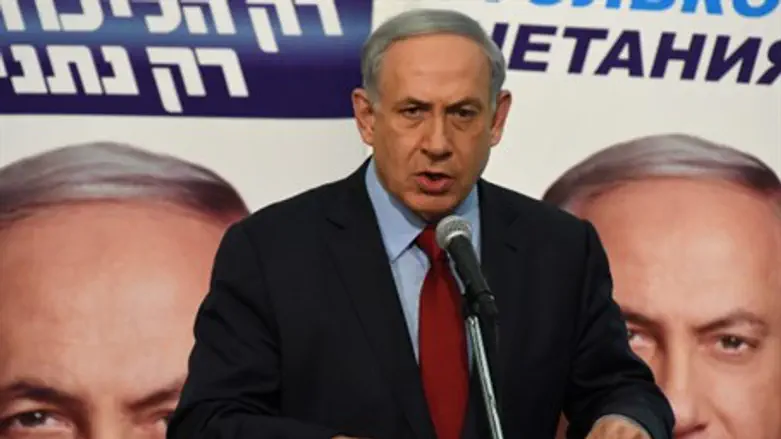
Senior sources in Jewish Home criticized Prime Minister Binyamin Netanyau on Friday morning for trying "to eliminate the party," which they claim he is doing to establish a coalition with his Labor rivals after elections.
In response to the statements made by the sources to Yedioth Aharonot, Netanyahu wrote on Twitter that the leftist media "wants to create a (fictitious) picture of division in the nationalist camp and of conflict between us to appoint Tzipi (Livni) and Buji (Yitzhak Herzog) after the elections. It won't work for them."
Netanyahu said his Likud party and Jewish Home have had an ideological partnership for many years, adding "Jewish Home will be a senior partner in my next government to the consternation of those wanting to see two medium-sized rightist parties in the opposition and an extreme leftist government in power."
In the statements Netanyahu was responding to, Jewish Home sources said the prime minister "is critically harming the chances of the right to win. In polls we were over 40 mandates together, and his work against Jewish Home is what dropped the two parties together to less than 35 mandates."
Despite the claims, polls have shown a consistent decline for Jewish Home from 15 to 17 seats down to 11 in the most recent poll Friday which has been a roughly constant trend since Jewish Home's Naftali Bennett appointed former soccer player Eli Ohana to the list. This occurred well before Netanyahu's trip to Eli in Samaria this week which the sources say harmed the two parties.
Speaking to Channel 10 on Thursday, Bennett admitted regarding Ohana "in retrospect I was wrong - I didn't read my public correctly."
According to the Jewish Home sources, Netanyahu declared "war" on their party, but "we'll show responsibility unlike Netanyahu and we will do everything to enable a right-wing government, but we won't sit in a government that won't truly be right-wing."
The bottle parable
The sources apparently were in an uproar after Netanyahu visited the pre-military academy of Bnei David in Eli on Wednesday, where he placed two bottles in front of him and gave a parable of the coming elections.
"This is the Likud, this is the left or Labor or however they call themselves now," Netanyahu said of the two bottles. "We need to go with the party that has the higher water level. The bloc doesn't determine, rather the size of the party is what determines - this is what was said in the briefing we were given."
"If this water level falls, and the water level in the leftist party is higher, a government 'that didn't know Yosef' will arise, a government that could simply submit the whole way," said Netanyahu using a quote from the Torah.
Bennett didn't take kindly to the parable, claiming that the briefing Netanyahu said was given regarding the president's recommendation for which party is given first try at forming a coalition was inaccurate.
Biggest party or best chances?
"In Israel the mission of forming the government is given to those with the highest chances of forming a government, and not those with the largest party," Bennett said. "For example, the president let Netanyahu form the past government despite Livni having the largest party."
The reference is to the 2009 elections in which Livni's Kadima had 28 mandates eking by Likud's 27, but still Netanyahu was given the first chance to form the government.
"Therefore Netanyahu will be the next prime minister. That's certain. The big question is who he will turn to - last time he turned to Tzipi Livni and appointed her justice minister, a critical position in the state of Israel," said Bennett.
Bennett made a call for support, saying "if you give a vote to Jewish Home you also crown Netanyahu prime minister and also make sure there will be next to him someone to stop terrorist releases and giving up territories."
The statement comes despite the fact that in the current coalition of Likud and Jewish Home, 78 Arab terrorists were released as a "gesture" to the Palestinian Authority (PA) in peace talks, and only in the last of the four batches of releases which also included terrorists with Israeli citizenship did Bennett make a clear stand to oppose the process.
